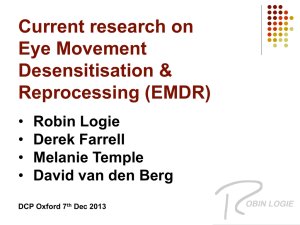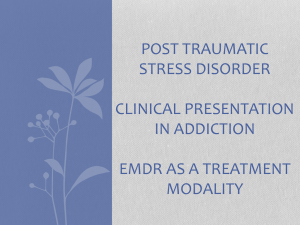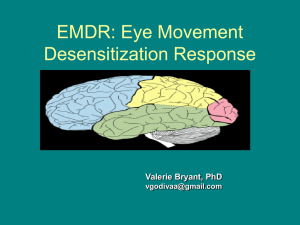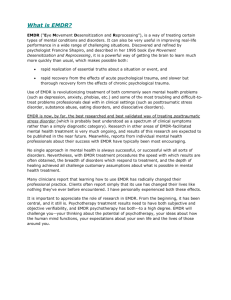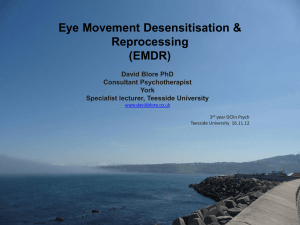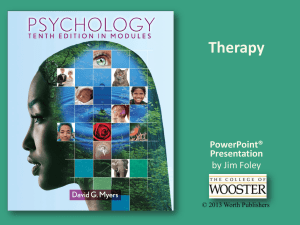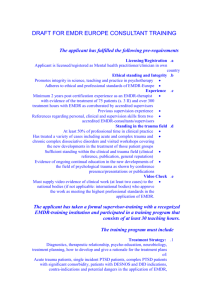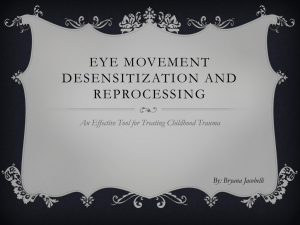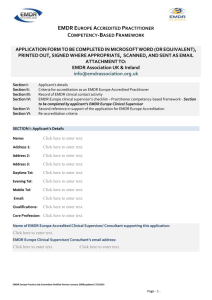LBR Brochure - University of Leicester
advertisement
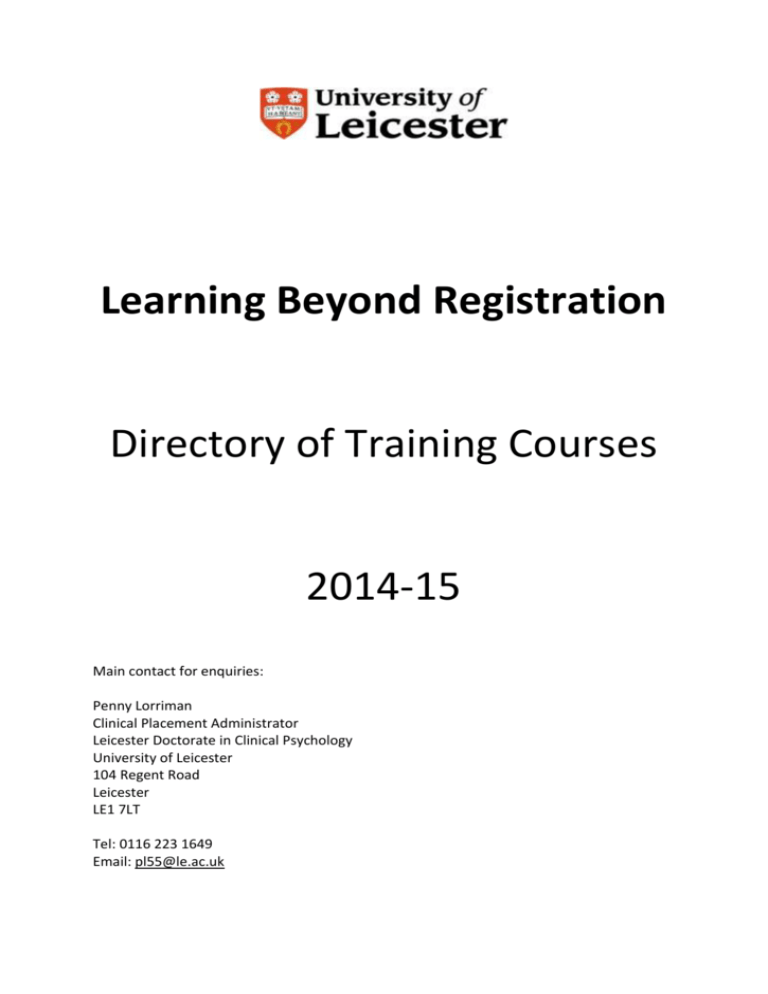
Learning Beyond Registration Directory of Training Courses 2014-15 Main contact for enquiries: Penny Lorriman Clinical Placement Administrator Leicester Doctorate in Clinical Psychology University of Leicester 104 Regent Road Leicester LE1 7LT Tel: 0116 223 1649 Email: pl55@le.ac.uk What is LBR? Learning Beyond Registration (LBR) is a scheme funded by Health Education East Midlands (HEEM) to provide additional professional training for qualified health professionals delivering NHS care in the East Midlands region. The University of Leicester has a contract to provide six modules of LBR training over the next four years. Four of these modules will be available for 2014-15. These include: 1. Supervision in Applied Psychological Practice (STAR) 2. Developing Reflective Practice in Services 3. Eye Movement Desensitisation Reprocessing (EMDR) 4. Selecting and Interpreting Neuropsychological Assessments : a refresher course for applied psychologists Dates for LBR modules 2014-15 Module Dates for 2014-2015 Supervision in Applied Psychological Practice (STAR) Tuesday 4 November 2014 Tuesday 24 February 2015 Tuesday 16 June 2015 Developing Reflective Practice in Services Monday 1 December 2014 Tuesday 2 December 2014 Wednesday 11 March 2015 Eye Movement Desensitisation Reprocessing (EMDR) Parts 1 & 2 Wednesday 4 March 2015 Thursday 5 March 2015 Friday 6 March 2015 Wednesday 17 June 2015 Selecting and Interpreting Neuropsychological Assessments : a refresher course for applied psychologists Monday 8 June 2015 Tuesday 9 June 2015 Monday 22 June 2015 1. Supervision in Applied Psychological Practice (STAR) Venue: College Court, University of Leicester Dates: Tuesday 4 November 2014, Tuesday 24 February 2015 and Tuesday 16 June 2015 Module Organiser: Steve Melluish This module is a professional development opportunity for Applied Psychologists working in health and social care settings. The completed module confers eligibility to join the Register of Applied Psychology Practice Supervisors (RAPPS). Why this module? To prepare qualified applied psychologists to supervise trainees, primarily clinical psychology trainees, following the nationally adopted learning outcomes for initial supervisor training for applied psychology. What can I expect to study? This is a Masters level module attracting 20 credits. It aims to equip participants with the knowledge, skills and experience required to supervise trainees. The training is designed to cover: developmental models of learning which may have an impact on supervision contracting and negotiating with supervisees the skill of giving constructive criticism: ongoing positive feedback and critical feedback where necessary. How is the course delivered? The module consists of a series of three study days, integrated with meetings in peer groups between the study days. Participation in the peer supervision groups is planned to facilitate learning consistent with a developmental model of adult learning. How will I be assessed? Assessment is via a Portfolio containing the following elements: Goal Attainment Scaling (self-generated goals, together with operational descriptions) Questionnaires to be completed by a supervisee Self-assessment questionnaires Reflective writing Participants will be asked to submit their Portfolio containing these assignments one month after the completion of day three. How can I find out more about this module? Please contact Penny Lorriman on the Leicester Doctorate in Clinical Psychology on 0116 223 1649 or pl55@le.ac.uk 2. Developing Reflective Practice in Services Venue: College Court, University of Leicester Dates: Monday 1 December 2014, Tuesday 2 December 2014 and Wednesday 11 March 2015 Module Organiser: Arabella Kurtz This module is a professional development opportunity for the following health professionals: mental health professionals (including the core professions of psychology, psychiatry and nursing); general practitioners who have completed a counselling or psychotherapy training; psychotherapists and counsellors who are accredited by UKCP, BACP or BABCP; occupational therapists and social workers with mental health training who work within a mental health setting. The completed module confers 20 Masters level credits. Why this module? To prepare qualified health professionals to run reflective practice groups. What can I expect to study? The module aims to equip participants with the knowledge, skills and experience to run reflective practice groups. The training is designed to cover the historical and current context within which reflective practice has developed, the theoretical literature on reflective practice in mental health services and the research evidence relevant to reflective practice, i.e. what it contributes in mental healthcare settings and what are the implications for how it is set up and developed in different services. The module will help participants develop skills in setting up a reflective practice group or piece of one-to-one work drawing on psychological models and approaches, overcoming obstacles at the contractual and beginning stages, maintaining a safe and boundaried setting, and drawing on the knowledge-base to inform decisions about when to bring the work to a close. How is the course delivered? The module consists of a series of three study days, integrated with meetings in peer groups between the study days. Participation in the peer supervision groups is planned to facilitate learning consistent with a developmental model of adult learning. Study days will consist of lectures, practical workshops and presentations of different types of reflective practice by clinical colleagues. How will I be assessed? Assessment is via a Portfolio containing the following elements: Goal Attainment Scaling (self-generated goals, together with operational descriptions) Questionnaires to be completed by a supervisee Self-assessment questionnaires Reflective writing Case study, in which participants will need to link experience with the theoretical and research literatures Participants will be asked to submit their Portfolio containing these assignments one month after the completion of day three. How can I find out more about this module? Please contact Penny Lorriman on the Leicester Doctorate in Clinical Psychology on 0116 223 1649 or pl55@le.ac.uk 3. Eye Movement Desensitisation and Reprocessing (EMDR) Parts 1 & 2 Venue: College Court, University of Leicester Dates for Part 1: Wednesday 4 March 2015, Thursday 5 March 2015 and Friday 6 March 2015 Date for Part 2: Wednesday 17 June 2015 Module Organiser: Steve Melluish This module is a professional development opportunity for the following health professionals: mental health professionals (including the core professions of psychology, psychiatry and nursing); general practitioners who have completed a counselling or psychotherapy training; psychotherapists and counsellors who are accredited by UKCP, BACP or BABCP; occupational therapists and social workers with mental health training who work within a mental health setting. The completed module confers 30 Masters level credits. Why this module? To prepare qualified health professionals to provide EMDR. What can I expect to study? The module aims to equip participants with the knowledge, skills and experience to provide EMDR. The course will explain the ideas behind EMDR and the theory of trauma. It will give particpants the skills in how to use EMDR as a therapeutic tool; how to identify the parameters that are treatable with the EMDR method; how to adequately prepare clients and give them safe ways in which to manage extreme emotions before embarking upon EMDR treatment; how to take a specialised history for identification of focal patterns and beliefs. It will also cover the selection criteria and cautions necessary for the safe use of EMDR and explain a variety of EMDR protocols for use with: PTSD/Trauma, Children and Adolescents, Grief, Phobias, Natural and other disasters, Couples and Abreactions. How is the course delivered? The module is split into two parts. Part 1 consists of a series of three study days that include a combination of didactic lectures, experiential workshops and role-play exercises, self-directed reading and private study, peer group seminars and fieldwork application to practice. The guided independent study willl involve self-dirdected reading about the evidence base for EMDR, the theory of trauma and the various applications of EMDR . The work based learning will involve using EMDR in clinical practice in the work place and will also include personal use of EMDR. The practical classes and workshops will offer opportunites for the demonstration of EMDR, supervised practice with EMDR and a review of the EMDR Basic Protocol and Case Consultation/Supervision. How will I be assessed? Assessment is via a Portfolio containing the following elements: Goal Attainment Scaling (self-generated goals, together with operational descriptions) Two case vignettes of EMDR in practice Short essay (a range of essay titles will be offered looking at the participants’ knowledge of EMDR and the theory of trauma) Self-assessment questionnaires Reflective writing Case study, in which participants will need to link experience with the theoretical and research literatures Participants will be asked to submit their Portfolio containing these assignments one month after the completion of the Part 2 day. How can I find out more about this module? Please contact Penny Lorriman on the Leicester Doctorate in Clinical Psychology on 0116 223 1649 or pl55@le.ac.uk 4. Selecting and Interpreting Neuropsychological Assessments: a refresher course for applied psychologists Venue: College Court, University of Leicester Dates: Monday 8 June 2015, Tuesday 9 June 2015 and Monday 22 June 2015 Module Organiser: Mary O’Reilly This module is a professional development opportunity for Applied Psychologists who are qualified to administer restricted psychometric procedures and who work in clinical or educational settings. The completed module confers 20 Masters level credits. Why this module? To provide an update to qualified health professionals on selecting and interpreting neuropsychological assessments. What can I expect to study? The module aims to provide participants with up to date knowledge, review their skills and develop their experience with the following anticipated learning outcomes: have a critical knowledge of how and why to select particular neuropsychological assessments for clinical cases; demonstrate a thorough knowledge of statistical measures of reliable differences between scores and to be able to apply this knowledge; to show the skills of interpretation of assessment results, drawing these into a comprehensive neuropsychological formulation; communicate a neuropsychological formulation with the aim of facilitating client understanding of their experience; communicate a neuropsychological formulation to professional colleagues with the aim of facilitating their understanding of the clients' experience; and demonstrate skills and competence in planning interventions based on the neuropsychological formulation. How is the course delivered? The module consists of a series of three study days which will use a combination of didactic lectures, experiential workshops and role-play exercises, guided and self-directed reading and private study, peer group seminars and fieldwork application to practice. The application to practice and demonstration of neuropsychological assessment and interpretation skills through case presentations to peers and a written assignment are key elements of this module. How will I be assessed? Assessment is via a Portfolio containing the following elements: Essay (a range of titles will be provided to cover age and ability range and also technical aspects of neuropsychological test construction and interpretation) Case presentation (delivered orally within peer groups) Case report Reflective writing Participants will be asked to submit their Portfolio containing these assignments one month after the completion of day three. How can I find out more about this module? Please contact Penny Lorriman on the Leicester Doctorate in Clinical Psychology on 0116 223 1649 or pl55@le.ac.uk
